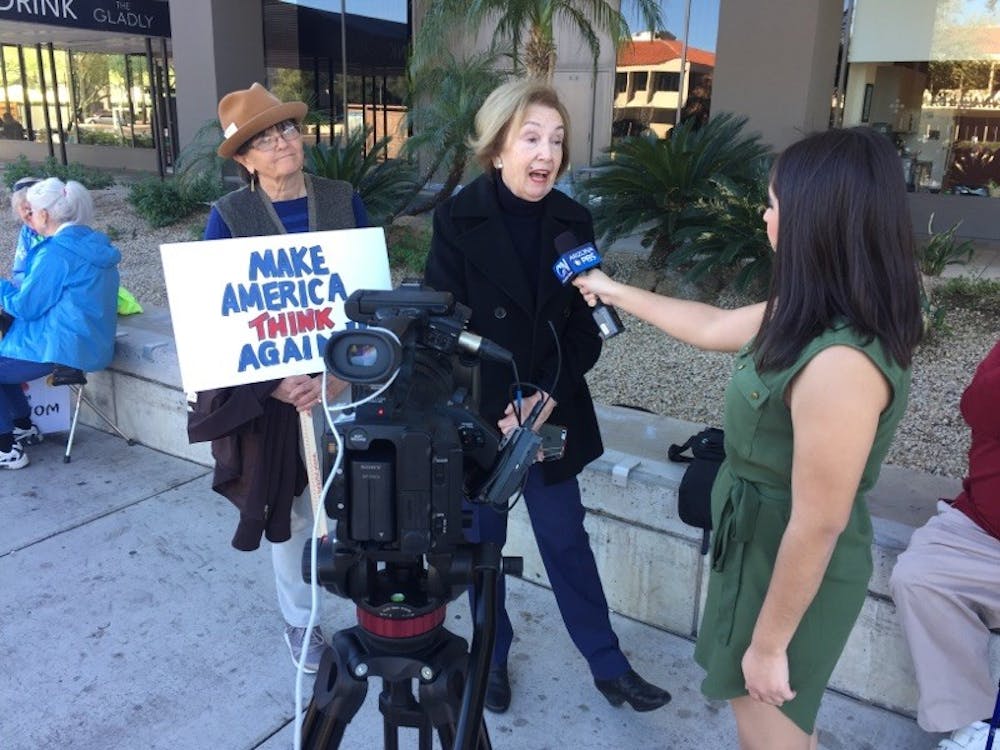The latest addition to Arizona PBS speaks Spanish.
The Walter Cronkite School of Journalism and Mass Communication added a new professional program called Cronkite Noticias, a newscast featuring six bilingual journalists who write and broadcast for the Spanish-speaking community in Arizona.
The program airs on UniMás, an English and Spanish television network owned by Univision, every Friday at 4 p.m.
Valeria Fernandez, a bilingual multimedia journalist, leads the new program as an adjunct Cronkite faculty member.
Fernandez said she hopes to build from her students' experience with English newscasts by producing newscasts and digital content in Spanish.
“It’s a bit of a challenge for them because they’re not only producing broadcasts in Spanish, but also they have to write for digital,” she said.
Fernandez said every type of journalism requires investigation.
“I’m really all about doing as much in-depth reporting as we can,” she said. “Whether it's Latina entrepreneurs or how the new Maricopa county sheriff plans to establish relationships with the Latino community.”
Fernandez said she wants her students to be three steps ahead on stories, so they can give their audience more analysis and in-depth reporting on issues in the community.
“We are aware that we are serving a Spanish-speaking audience that is very much in need of quality reporting,” she said. “So it doesn’t matter that it’s coming out of the university or being produced by students.”
Fernandez said her students take their work seriously and produce news just like any news outlet.
Fernandez also said all of her students are at varying levels of language proficiency, but for the most part they are fluent in writing and speaking Spanish.
“It’s really, really important that if they are interested in producing journalism in Spanish that they read a lot of media in Spanish,” she said. “(The students) get into the habit of adding to their daily meals of news reading Spanish content.”
Fernandez said that for some of her students, this is the last semester before they must go out in the world to work for a news outlet.
“I hope the skills that my students are putting into practice and enhancing will help them whether today or tomorrow when they’re writing in, well, Mandarin,” she said.
Fernandez said the Latino community continues to grow in Arizona.
“It will help you be a little more aware of the Latino community,” she said. “There’s just so much diversity of perspectives and opinions and culture.”
Kenya Vasquez, a senior studying journalism, is a reporter for the first group of students at Cronkite Noticias. She speaks Spanish as her first language, and English is her second.
“I definitely think it’s benefiting me and preparing me for when I graduate in May to know what the real world is like,” she said. “I think this is great practice for us.”
Vasquez said she doesn’t have beats, which means she covers a large variety of subjects regarding the Hispanic community.
“I think it’s benefiting (the Arizona audience) because all our stories are relevant to Hispanics and what is going on in our society, to keep them well-informed of issues that go around in the community,” she said.
Vasquez said she hopes to land a job in the Spanish media after graduation.
“I’m just really excited that the school finally has the program in Spanish, and that can help other Hispanic students here that want a career in Spanish television,” she said.
Maya Foxall, a freshman studying journalism, said she aspires to be a bilingual journalist or foreign correspondent. She started speaking Spanish when she was about five or six years old.
Foxall said she believes Cronkite Noticias would help her pursue her goals as a student because the connection between the school she goes to and the language she speaks would give her a chance to pursue bilingual journalism.
“It will give me the outlet that I need,” Foxall said. “Especially because of the field of study I want to go into with broadcast.”
Reach the reporter at anbuechl@asu.edu or follow @alexa_buechler on Twitter.
Like The State Press on Facebook and follow @statepress on Twitter.




